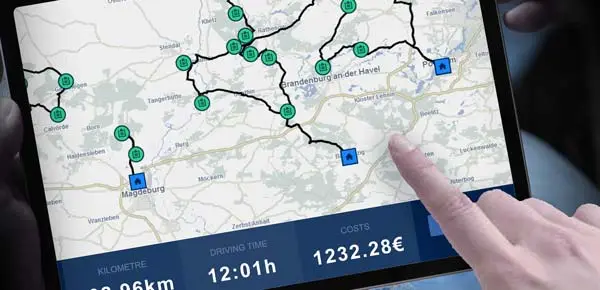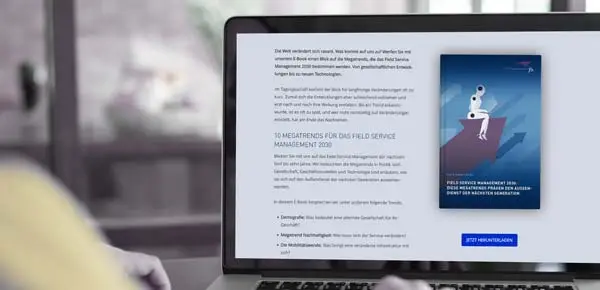
BLOG / SOLUTIONS · ROUTE OPTIMISATION
INTEGRATE ROUTE OPTIMISATION FOR FIELD SERVICE ENGINEERS
20 June 2023 · James Alex Waldron
1. THE IMPORTANCE OF ROUTE OPTIMISATION
For field service engineers (sometimes operatives, technicians, and inspectors), the time between appointments is precious. Poorly planned routing leads to unnecessary trips, longer travel times, and higher fuel costs and CO2 emissions. In addition, inefficient route planning also leads to poor customer service. Engineers can arrive at their appointments late or unprepared. Therefore, route optimisation is critical for retention and loyalty across head office, engineers, and customers: profitability.2. DIFFERENCE BETWEEN ROUTE OPTIMISATION AND TOUR OPTIMISATION
Route optimisation and tour optimisation in field service are related concepts, but they involve different aspects of planning and coordinating service engineers and field service assignments. Route optimisation refers to identifying the best route between two points, taking into account factors such as distance, traffic and travel time. The goal is to find the shortest and most efficient route to save time and fuel.Tour optimisation is a modern, comprehensive approach that focuses on planning and coordinating multiple stops in a specific order to increase the overall efficiency of a tour. For your field service engineers, this involves the efficient scheduling of work orders and appointments. Aspects such as customer appointments, SLA service times, vehicle capacities and legal regulations come into play, much more than A-B route planning.
While route optimisation focuses on the most efficient route, tour optimisation aims at the optimal allocation of orders to the available field employees, which results in tour plans across your entire mobile workforce.
Read more: Remove postcode patches and more in the difference between route planning and tour planning.
3. ADVANTAGES OF EFFICIENT ROUTE PLANNING
Efficient route planning for field service engineers and field workers creates transparency and designs a variety of benefits, including:- Time saving: Optimal routes minimise travel time between appointments, allowing technicians and field staff to serve more customers in less time (time to respond). This makes them more productive and gives them more time with the customer.
- Fuel savings: Companies will reduce fuel costs through route optimisation. Fewer miles and more efficient routes lead to less fuel consumption and lower CO2 emissions, which is both economically and ecologically beneficial.
- Improved customer service: Efficient route planning makes it possible to arrive at customer appointments on time and well prepared for an improved first-time fix, which leads to higher customer satisfaction and better customer retention (loyalty).
- Reduced personnel costs: When service engineers and field workers use their time efficiently, companies can reduce their personnel costs. Optimised route planning means less idle time and costly overtime/subcontracting.
4. ROUTE OPTIMISATION SOLUTIONS
There are several technologies and software solutions that can help companies optimise routes. Some of the most important solutions are:- GPS technology: Connected GPS devices and applications allow service engineers to access geocoded address data (not postcodes), real-time traffic, and weather information to adjust their routes accordingly. Features such as parking data avoids delays and minimises travel times.
- Route planning software: There are many route planning/route scheduling software solutions on the market specifically designed for field services. These programmes use advanced algorithms to design optimised tours and routes based on factors such as distance, traffic, customer preferences and available resources - aligned to your specific SLAs and KPIs. One example is our software FLS VISITOUR for route and resource optimisation in real time.
- Mobile apps: Mobile apps like FLS MOBILE for service technicians and field workers provide real-time access to appointment information, customer history, required resources, and their optimised routes. This enables workforces to better respond to customer needs and increase their work efficiency.
- Integration into existing systems: The integration of route optimisation solutions into existing company systems, such as CRM, ERP, or Job Management systems ensures that all relevant information is centralised and easily accessible. This facilitates the planning and coordination of schedules and resources and improves the efficiency and profitability of the company without relying on human intervention.
5. BEST PRACTICES FOR THE IMPLEMENTATION OF ROUTE OPTIMISATION
To fully exploit the potential of route optimisation solutions, companies should consider best practices when considering these technologies:- Available training: Ensure that your route optimisation provider offers head office and field service engineers sufficient ongoing training to effectively use the technologies. Thorough training leads to higher acceptance and more effective (and earlier) use of the solutions.
- Continuous improvement: Consider how you'll monitor the performance of the route optimisation solutions. On a regular basis, assess their effectiveness and identify areas for possible improvement (do not simply rely on your initial project requirements). This can be done by regularly reviewing industry benchmarks and KPIs such as travel time, fuel costs and consumption, and customer churn rates.
- Adaptability: Be open to further adaptations and improvements to respond to changing market conditions and customer requirements. Route optimisation solutions should be flexible and scalable to meet the changing needs of the business.
FIELD SERVICE PROCESSES: SOFTWARE FOR A SUCCESSFUL FUTURE
To gain an understanding of future-ready tools to optimise the field experience across your organisation book a short discussion or contact us at info@fastleansmart.com.Read more:
How to begin Field Service Resource planning
Route planning SaaS: Software-as-a-Service or on-premise software models?
11 reasons professionalise your Route Planning
Professional Route Planning software: Are you ready?
Introducing Route Planning software into your ERP software

JAMES ALEX WALDRON
UK Marketing Manager
+44(0) 1183 800189
Send email
James Alex Waldron has worked in written communications for over 15 years. Since 2021, he has written for FLS and the Solvares Group on the topics of digital field service transformation and mobile workforce management, and regularly provides insight to the industry press.






